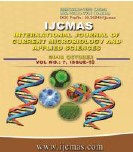


 National Academy of Agricultural Sciences (NAAS)
National Academy of Agricultural Sciences (NAAS)

|
PRINT ISSN : 2319-7692
Online ISSN : 2319-7706 Issues : 12 per year Publisher : Excellent Publishers Email : editorijcmas@gmail.com / submit@ijcmas.com Editor-in-chief: Dr.M.Prakash Index Copernicus ICV 2018: 95.39 NAAS RATING 2020: 5.38 |
In India, sugar industry is the second largest agro-based industry producing enormous quantities of by-products like molasses, pressmud etc. The Treated Distillery Effluent (TDE) is waste water, which could be recycled in agriculture both as irrigation water and as a source of plant nutrients. The beneficial effect of organic matter for enhancing the soil fertility and thereby improving the crop productivity is well established. Thus, the soil application of TDE could offer the double benefit of safe disposal of wastes and its effective utilization for agricultural production. A field experiment was conducted to study the effect of Treated Distillery Effluent (TDE) and biocompost on soil phosphatase activity using paddy as a test crop (ADT- 43). The application of TDE @ 1.0 lakh litres ha-1 (M3) or TDE @ 1.5 lakh litres ha-1 (M4) along with 37.5% N as urea + 37.5 % N as biocompost (S7) increased the soil phosphatase activity. Based on the increase in soil phosphatase activity, it can be concluded that TDE @ 1.0 lakh litres ha-1(M3) or TDE @ 1.5 lakh litres ha-1 (M4) along with 37.5% N as urea + 37.5 % N as biocompost (S7) can be recommended as a nutrient source for paddy crop.
 |
 |
 |
 |
 |